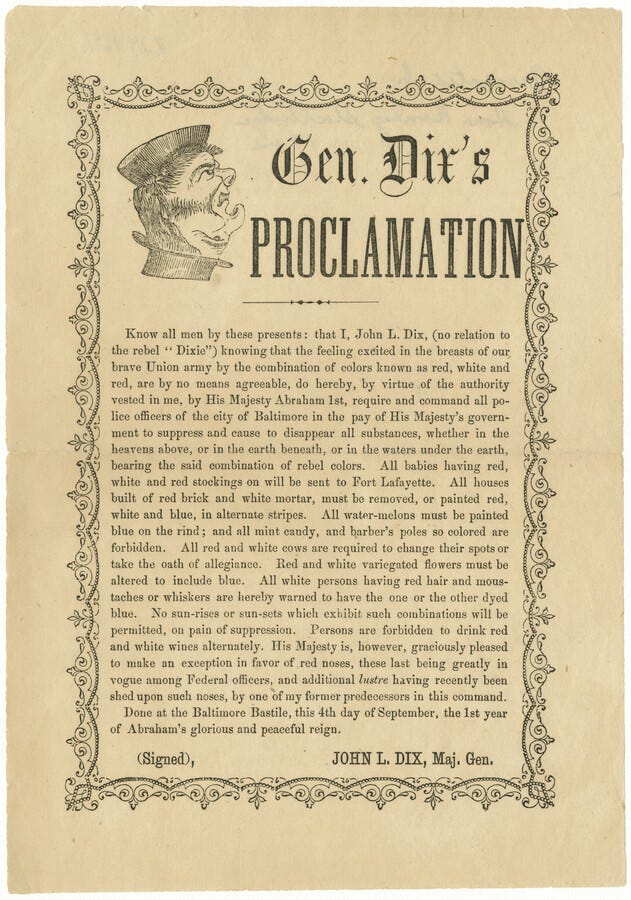Union General Dix Chastised by Arrested Woman in Baltimore
A news article from January 3rd 1862 in the Richmond Daily Dispatch

The Warsaw of America
The people of the South, remarks the Charleston Courier, will never know the full extent of the sufferings and indignities which have been heaped upon the noble people of Baltimore by the military despotism of the Lincoln Government. Especially have the high-souled women of the Monumental City proved their claim to the admiration of the world. Insulted, persecuted, and imprisoned, through all they have clung with heroic fortitude to the cause of their beloved South. They have sent forth their sons and brothers and husbands to smite the invader upon every battle field along the border, and the wounded soldiers in the camp hospitals will tell that among the tenderest and most zealous of their nurses are the fair exiles of Maryland. A lady, one of the hundreds who have fled to Virginia from beyond the Potomac, sends to us the following narrative of facts, which may serve as an instance of the unconquerable spirit of the women of Baltimore, under the petty outrages to which they are continually subjected by the brutal Yankee soldiery:
Spicy Interview between General Dix and a lady of Baltimore
A Mrs. W., of Baltimore, about to pay a visit of a few days in the country to some relatives was driving through the city, in her own carriage, with her trunk stropped behind. Suddenly the vehicle was stopped by a policeman, who assured the lady she was under arrest, and would be obliged to repair immediately to the office of the Provost Marshal.
Mrs. W., somewhat indignant at the request, refused to go, alleging as an excuse, that such a public place was unfit for a lady to frequent. She said that she would go to the commanding General, Dix, at Fort McHenry, but if the policeman attempted to take her to the Provost Marshal, she would shoot him.
The miserable hireling, cowed from fear of an armed woman, said very humbly, "As you please, Madam; I will get into the carriage and go to the Fort with you."
"You are mistaken," replied Mrs. W., "this carriage is mine, and if you attempt to get into it, I will immediately fire upon you."
The Lincoln policeman, again cowed, obeyed Mrs. W., who ordered him to take his seat with her coachman in whom she confided as her protector. Mrs. W. told him to drive to Fort McHenry.
Reaching the Bastille, she sent for General Dix, who, always disconcerted when visited by ladies, was peculiarly so on this occasion — seeing a lady with baggage, as though she were a "State prisoner."
Advancing to Mrs. W., he said, "Madam, not know how to address you."
Mrs. W. — It is time you did, sir, since I am arrested, I suppose, on your authority. General Dix . — Madam, you look wearied; walk into my office. (Ordering some regulars to bring in the trunk and search it, he remarks to Mrs. W. "This is a military necessity, Madam. I would these things were not, but the Government must be supported." "United we stand," you know. Madam have you any sons in the Confederate army?
Mrs. W. — I have three, sir.
General Dix — Did you aid and encourage them to enlist in that service?
Mrs. W. — General Dix , are you a married man?
Gen , Dix — I am, Madam.
Mrs. W. — Then ask your wife what she would have done under similar circumstances.
Then was heard from one of the General's satellites,"The rebel spirit of the Baltimore woman! It will never be extinguished!"
General Dix — Madam you look faint and weary, let me order some refreshments.
Mrs. W. — What, eat here! I, a Southern woman, break bread with the Yankees. Never, while they are the miserable foes they have proved themselves. Every day I see more clearly the necessity of an eternal separation. And where the dividing line is fixed, I want a wall built so high that a Yankee can never scale it!
The trunk-breakers having satisfied themselves that nothing objectionable to the administration could be found, reported the same to General Dix, who consulting with the above-mentioned satellites (brilliant aid no doubt) determined to have the person of Mrs. W. searched. The gallant General remarked; "Madam, it is necessary now that your person be searched; you will not object I hope."
Mrs. W. — Oh, no, sir, if the person to perform that ignoble office is a female.
General Dix — Oh, yes, madam, a lady, your equal.
Mrs. W. — Sir, you are mistaken; not a lady, nor my equal. Were she either, she would not do the degrading work you assign her.
Mrs. W. was taken to a private apartment, and the search was begun. Finding the woman delinquent, Mrs. W. threatened to report her if she did not perform her duty more faithfully. "Pull off my shoes," she continued, look, well into them; make a thorough search, and see if you can find a combination of red and white, or anything inimical to the Union-savers; look well, or I will report you.
The woman finding nothing treasonable upon Mrs. W., returned with her to the gallant General, telling him she would not search another lady for five hundred dollars; that such a persevering character she had never encountered.
General Dix, shocked no doubt, at Mrs. W's agitated appearance, again proposed refreshments: "Madam," he said, "do have a glass of wine."
Mrs. W. — Only on the condition, sir, that you will drink with me to the health and success of [Confederate] Gen. Beauregard.
The wine, I believe, was not taken.
Mrs. W., then turning to General Dix, said:
— "Sir, I hope you are satisfied that I have nothing traitorous to your righteous cause. You thought to find the Confederate Flag in my trunk, or on my person; indeed, you are not good at hide and seek. Your soldiers are too little interested in your righteous cause to serve you faithfully. They searched my house a fortnight since for the Flag. Both you and they have been fooled. I sent that Flag to Virginia ten days since, under a load of wood; it now waves over the glorious Confederates at Manassas. Sir, it seems the Yankees' peculiar pleasure is to try to frighten women and children. They cannot gain battles, so they revenge themselves in this ignoble manner. And now, sir, I imagine you have done."
Gen. Dix — I regret, Madam, that we should have met under these unfortunate circumstances. I will detain you no longer.
Mrs. W. — Sir, I demand one thing of you before I depart. I have been arrested on suspicion. I desire now an honorable discharge.
Gen. Dix — Oh, madam, that is unnecessary. It is a mere form, and therefore useless.
Mrs. W. — I like forms, Gen. Dix, particularly when connected with official documents.
The General seeing Mrs. W. determined, ordered the Secretary to write the discharge, and handing it to Mrs. W. said, Madam, I believe that is all.
Mrs. W. — No, sir; not all yet. I wish your name added. I believe that is essential to such a document.
The General, more reluctant to sign his name than to grant the discharge, was finally brought to the point.
Mrs. W. — And now, Gen. Dix , do you know what I intend doing with this discharge? — I shall send it to my sons at Manassas, and, if they have any of the spirit of their mother, they will one day make you rue this encounter.
After Mrs. W. left, they say, the General vowed he would not see another woman for three years, three months, three weeks, and three days, calling, no doubt, to mind Richard Court de Lion's famous truce with Saladin.




